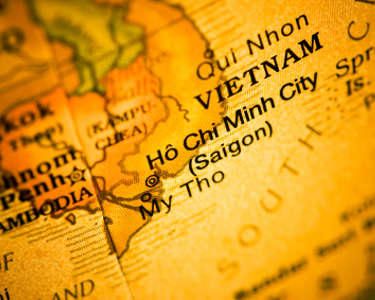Police in Vietnam Attack House Church, Jail Leaders
 HANOI, Vietnam– Police invaded the Sunday service of the Agape Baptist congregation in Vietnam’s Hung Yen Province on June 7 and beat worshippers, including women, and arrested a pastor and an elder.
HANOI, Vietnam– Police invaded the Sunday service of the Agape Baptist congregation in Vietnam’s Hung Yen Province on June 7 and beat worshippers, including women, and arrested a pastor and an elder.
Christian sources said police put the two church leaders into separate cells, and each man was beaten by a gang of five policemen. Pastor Duong Van Tuan of the house church in Hamlet 3, Ong Dinh Commune, Khoai Chau district said that officers beat them in a way that did not leave marks: hard blows to the stomach.
The beatings came in retaliation for Tuan refusing to leave the area as police had ordered, Christian sources said. He and the church elder were released later that evening.
The congregation in Hung Yen, a small but populous province that straddles the Red River 50 kilometers (31 miles) south of Hanoi, has endured harassment and attacks by police and other officials since April. Police officers disrupted worship services on April 19, bloodying Tuan’s mouth with punches, and also on May 24 and 31.
In the May 31 incident, he was attacked as he preached. The deputy commune police chief, identified only by his surname of Them, grabbed him by the neck while another officer tore the Bible from his hand, Christian sources said. His arms were twisted behind his back and “he was marched off like a criminal gang member,” one said.
Authorities took Tuan to the office of the commune people’s committee, clubbing him several times en route. Immediately after arriving at the office, police tried to force him to sign a document saying he had resisted their investigation, though he had yet to be questioned, and said that he was under administrative arrest. Christian sources said he was also ordered to sign a document accepting the seizure of his Bible, which they had taken from him two hours prior.
Officers ended by issuing him an order “to leave the commune immediately by the most direct route.”
A woman from his congregation who was unable to obtain cooperation from authorities at lower levels, Le thi Nhung, prepared and sent a detailed, three-page petition to local, provincial and national authorities on June 1, a week before officers last stormed their worship service.
In the petition, Nhung explained that one of the first things Tuan did on his arrival in March was to explain to church elders how to register their congregation’s activities according to the Prime Minister’s Special Directive on Protestantism of 2005. This directive permits and urges local authorities to register house churches to carry on religious activities. Tuan also went to the local Fatherland Front chair, a woman identified only as Hao, explained the church’s aspirations and asked her to help them meet requirements.
The church elders submitted an application to register locally, in accordance with the directive. Authorities, however, did not respond within the 30-day period prescribed by the directive. On the 31st day, they sent a document denying registration.
Bogus Denial
Officials gave two reasons for denying registration, Christian sources said: that the congregation needed permission from higher authorities, including the central Bureau of Religious Affairs; and that in any event the Prime Minister’s directive applied only to churches on mountains and not to churches on plains.
Both reasons, local Christians said, are contrary to the directive.
The church’s petition to the government clearly spelled out two articles of the constitution (71 and 73) and four articles of Vietnam’s criminal code (87, 124, 129 and 33) that police and local authorities violated in attacking their church and pastor.
The petition also reflects awareness of related international affairs. It says that on national news in Vietnam on May 27, church members heard the appeal of Ministry of Foreign Affairs officials to the U.S. Congress to vote down a recommendation by some U.S. officials to return Vietnam to the U.S. list of worst religious liberty offenders as a “Country of Particular Concern.”
“Think of how much hard work by the government, the Ministry of Public Security and the Ministry of Foreign Affairs, has just been thrown into the ocean by the officials of Ong Dinh Commune,” the petition states.
It concludes with a respectful request to all appropriate government authorities to investigate and “to help us law-abiding, tax-paying citizens of Khoai Chau District who practice pure and orthodox religion to peacefully practice our faith as a right protected by the State.”
In separate letters to supporting friends abroad, the leaders of the Agape Baptist House Church group, with 34 congregations throughout Vietnam, say that according to their long experience, “persecution is often a sign that the Lord is at work.” They add that they are not discouraged and see a growing maturity among Christians who suffer and overcome such gratuitous abuse. But they also say they feel much pain in seeing their Christian family disrespected, mistreated and abused.
The experience of this congregation is not uncommon, Christian sources said. Other unregistered house church groups report their requests for registering local congregations are being either ignored or denied.
Compass sources said they rarely see such abuse as well-documented as in this case. Said one advocate, “It would be very easy for authorities to follow this up and do the right thing, but few expect they will. It illustrates once more the famous Vietnamese maxim, ‘The law of the Emperor yields to the custom of the village.'”
This story was originally published at www.CompassDirect.org.












